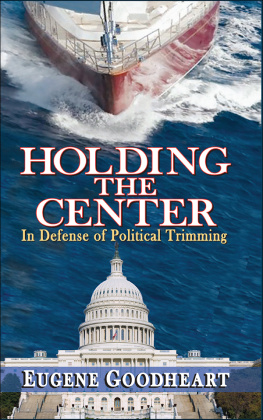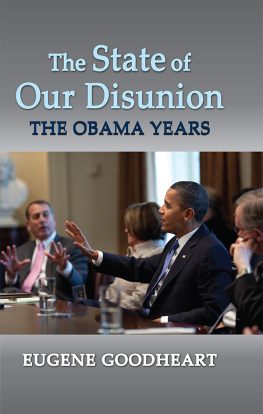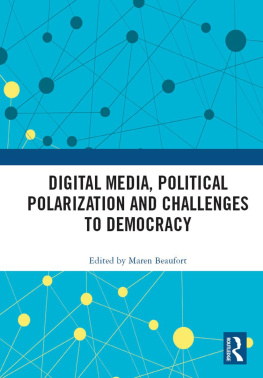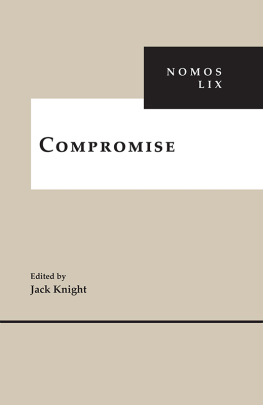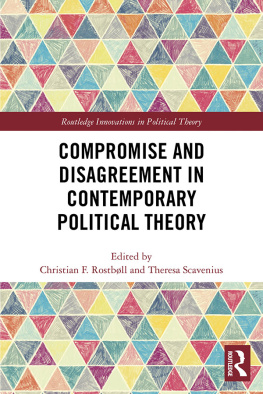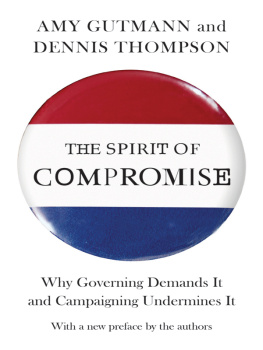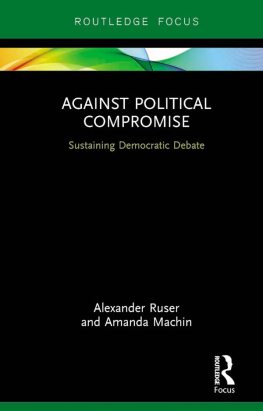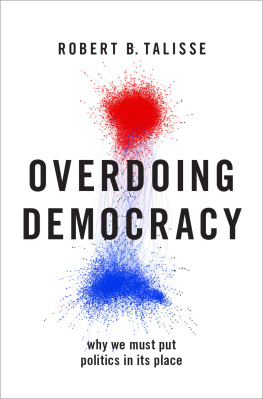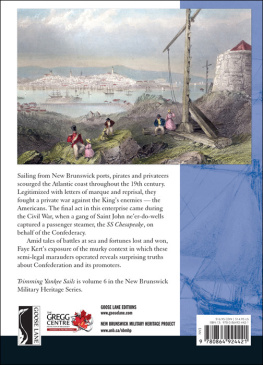First published 2013 by Transaction Publishers
Published 2017 by Routledge
2 Park Square, Milton Park, Abingdon, Oxon OX14 4RN
711 Third Avenue, New York, NY 10017, USA
Routledge is an imprint of the Taylor & Francis Group, an informa business
Copyright 2013 by Taylor & Francis.
All rights reserved. No part of this book may be reprinted or reproduced or utilised in any form or by any electronic, mechanical, or other means, now known or hereafter invented, including photocopying and recording, or in any information storage or retrieval system, without permission in writing from the publishers.
Notice:
Product or corporate names may be trademarks or registered trademarks, and are used only for identification and explanation without intent to infringe.
Library of Congress Catalog Number: 2012025055
Library of Congress Cataloging-in-Publication Data
Goodheart, Eugene.
Holding the center : in defense of political trimming / Eugene Goodheart.
p. cm.
ISBN 978-1-4128-4981-4
1. Political culture--United States. 2. United States--Politics and government. 3. Political parties--United States. 4. Polarization (Social sciences)--United States. 5. RadicalismUnited States. I. Title.
JK1726.G655 2013
320.973--dc23
2012025055
ISBN 13: 978-1-4128-4981-4 (hbk)
Turning and turning in the widening gyre
The falcon cannot hear the falconer;
Things fall apart; the centre cannot hold;
Mere anarchy is loosed upon the world,
The blood-dimmed tide is loosed, and everywhere
The ceremony of innocence is drowned;
The best lack all conviction, while the worst
Are full of passionate intensity.
(opening stanza, W. B. Yeats The Second Coming 1919)
As an undergraduate in Columbia College, I took a course called Contemporary Civilization with the distinguished American historian Richard Hofstadter. The assignment for one of the classes was The Communist Manifesto. At the time it was in the prehistoric year 1950I thought of myself as a Marxist. Professor Hofstadter entered the room and without saying a word turned to the blackboard and wrote the following sentence: The history of all societies present and previously existing is a history of class cooperation. I was a great admirer of Professor Hofstadter (he was a terrific teacher, and because of his course I almost decided to change my concentration from English to history), but I couldnt believe the mistake he made. The sentence from the Manifesto, as anyone who has ever read it knows, reads, The history of all societies present and previously existing is a history of class conflict. So I raised my hand to correct him. Professor Hofstadter smiled and said, I know that, but [addressing the class] I want you tell me whats wrong with saying that it is a history of class cooperation. Classes may be in conflict, but they also cooperate. One could write a history of the world from the point of view of cooperation as well as of conflict. I had been taught by my Marxist mentors to believe that conflict was the whole truth of class relations, and my first impulse was to resist what Professor Hofstadter was saying. But I knew that it was to my intellectual advantage to listen and take seriously what he had to say, even if it rattled my confidence that I possessed the truth. What he taught me was that there are different ways of seeing and understanding the world. It was a lasting antidote to my dogmatism, a decisive and liberalizing moment in my liberal education.
Listening receptively to the views and arguments of people who disagree with you may unsettle your own views, but those other views may also strengthen them by forcing you to revise your arguments to make them more persuasive. Years later I reflected upon the authority Hofstadter exercised on me. The early 1950s was the period of the Cold War between America and the Soviet Union. Im sure that Professor Hofstadters little lesson about class warfare and class cooperation had something to do with the side that he took in the war. Ideologically, the American side stood for class cooperation, the Soviet side for class warfare. Like many intellectuals of his generation, he had experienced the temptation of Marxism and had become disillusioned with the practices of the Soviet Union and the Communist parties that supported it. Did the partisan origins of Hofstadters insight necessarily invalidate it? The genesis of an idea, philosophy teaches, does not provide a standard for judging its validity. Whatever side you were on, you had to take his argument seriously on intellectual grounds, with the caveat that you needed to apply the same critical pressure to his argument that he had applied to Marxs. Class cooperation is a fine thing, but at times conflict is a necessity. The exchange with Hofstadter did not proceed to that point, although I am confident that he would have agreed. A lesson of history, if there are lessons to be drawn, is that there is a time for conflict and a time for cooperation. Or it may be that in every period of history there is both conflict and cooperation, with the emphasis being either on the former or the latter depending on circumstance. Arthur Schlesinger, from a liberal perspective, characterizes the problem of classes as follows: Class conflict is essential if freedom is to be preserved, because it is the only barrier against class domination: yet class conflict, pursued to excess, may well destroy the underlying fabric of common principle which sustains free society (173). (Given the current economic crisis, I believe we are now at a moment in history when cooperation between classes and between political parties is what is called for and what is sorely lacking.) In any event, the dialectic of discussion and argument inside and outside the classroom is what I remember best about my college experience. It was the nutrition of my mental life and it continues to sustain me.
The mind of the politician tends to be ideologically fixed in its commitments, slogans often substituting for thought. The disinterested mind, or what Wallace Stevens called the unresting mind, is constantly in motion, never content with its formulations in its pursuit of truth. Disinterestedness, the skeptics say, assumes what is a cognitive illusion, the possibility of a subjective-free objectivity. Here is a minimal definition of disinterestedness: resisting the impulse to stop thinking and wanting to act before taking into account all the strong objections that might be made to a course of action. Every act of seeing and knowing occurs within a perspective, whether personal or communal. But the person capable of disinterestedness has the ability to suspend the perspective and scrutinize it critically and, if warranted, abandon it for another more persuasive perspective. The risk of disinterestedness lies in its hesitations when action is required. President Truman once said, give me a one handed economist, meaning that too many on the other hands may make for indecisiveness. However, given the misguided decisiveness of our political leaders in recent years, we might have benefited from more on the other hands from our political leaders.
The germ of this book was an essay I published in 2001 that made a case for trimming. The term has its origins in seventeenth-century England. The original trimmer was Charles Savile, the first Lord Halifax and author of the Character of a Trimmer. Savile served in the government during the reign of Charles II and was widely admired for intelligence, integrity, and moderation during a time of extreme political and religious polarization. The English historian Thomas Babington Macaulay provides a vivid portrait of Savile:

